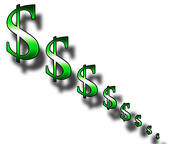Imagining a world without the dollar (MIGHT LOOK MORE LIKE A NIGHTMARE) (Page 2)
By Barry Eichengreen
 In a world without dollars, it follows, the right to issue notes would have to be limited to a set of regulated entities — call them banks. This was how currency entered circulation before the Civil War. Banks printed up and lent out engraved bank notes. State legislatures required them to hold gold or securities sufficient in value to redeem their notes.
In a world without dollars, it follows, the right to issue notes would have to be limited to a set of regulated entities — call them banks. This was how currency entered circulation before the Civil War. Banks printed up and lent out engraved bank notes. State legislatures required them to hold gold or securities sufficient in value to redeem their notes.
The problem, predictably, was that not all states enforced their regulations vigorously. Some allowed banks to carry government and railway bonds on their books at full value when they were worth only cents on the dollar. If there was a rush to redeem bank notes, the issuer would find it impossible to do so.
Hence, not all bank notes were created equal. It mattered greatly by whom they were issued. Sensing a need, specialized collectors of financial intelligence leapt into the breach, publishing newsletters known as “note reporters” that listed the prices at which different bank notes traded, reflecting the issuer’s good reputation or lack thereof.
The 21st-century analog would be our local farmer scanning each individual bank note with a smartphone to see exactly how many carrots it was worth before taking it in payment. Doable, perhaps, though this would certainly slow down the payment process.
More generally, it is tempting to imagine technology filling this void. In a world without dollars, every ambitious Internet company would build a platform for transactions, featuring an electronic currency in which prices were expressed, payments made and receipts accumulated. It’s no stretch to imagine the Facebook credits now used to purchase items in games evolving into a more widely used electronic currency (perhaps nicknamed “Facebacks”).
While there have already been some attempts to create a true electronic currency, such as Bitcoin, these have had difficulty getting off the ground. It is not hard to see why. If it is possible to imagine one private electronic currency, then it’s possible to imagine several, and there would be no guarantee that other people would accept the particular electronic money you use.
Moreover, these payment systems would be only as reliable as the individual companies’ software and servers, which would be impossible for end users to judge. Also, nothing would ensure that the electronic money you accumulate would hold its value, and nothing would prevent the operators of the platform from issuing more, in the first instance to themselves. If people worried that their electronic money was losing value, they would rush to convert it into merchandise; others might simply refuse to accept it as payment. The whole scheme would come crashing down.
That’s why we have the Fed. It regulates the supply of money. It supports the payments system, providing the exceptional liquidity needed for its smooth operation in turbulent times such as those following Lehman Brothers’ failure. It inspects the banks and works with the Federal Deposit Insurance Corporation, which provides deposit insurance to bolster confidence and prevent bank runs.
Critics of the dollar are having a field day. But when I think about our current monetary arrangements, I am inclined to paraphrase Winston Churchill on democracy: Ours is the worst possible system, except for all the others.
Barry Eichengreen is a professor of economics at the University of California at Berkeley and the author of “Exorbitant Privilege: The Rise and Fall of the Dollar and the Future of the International Monetary System.”
Read Page 1 why economists are considering getting of the almost worthless dollar.
© 2011 The Washington Post Company
Sources:
- http://visiontoamerica.org/365/imagining-a-world-without-the-dollar/
- http://www.washingtonpost.com/opinions/imagining-a-world-without-the-dollar/2011/04/26/AFjawKEF_story.html
- Please click LIKE at the top.
- Share with your friends, click share below.
- Leave a comment.
- Thanks!
- Donna Calvin, The Word Warriorette
- Proclaiming Warning to a Sleeping Nation

